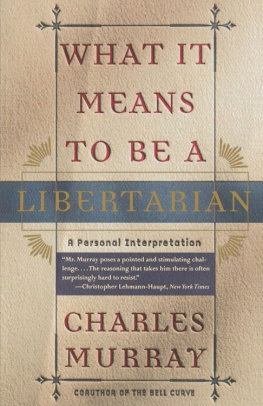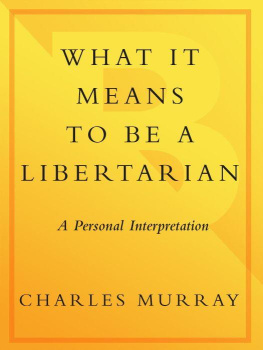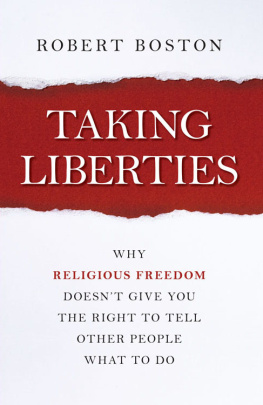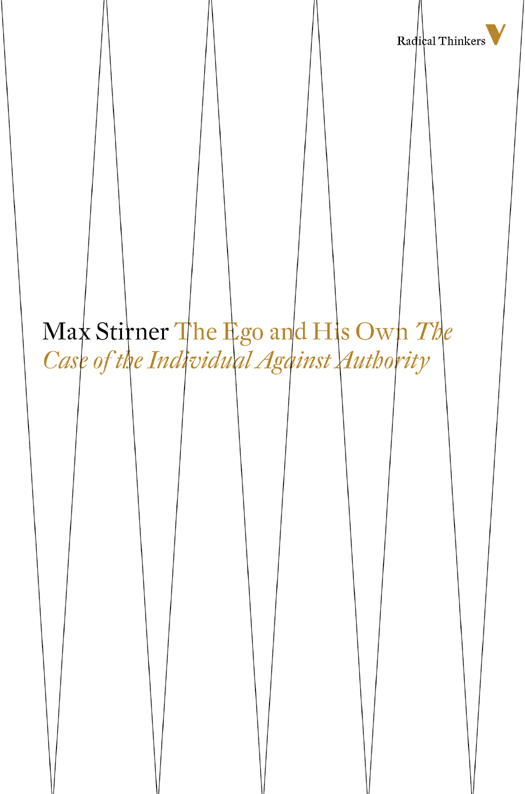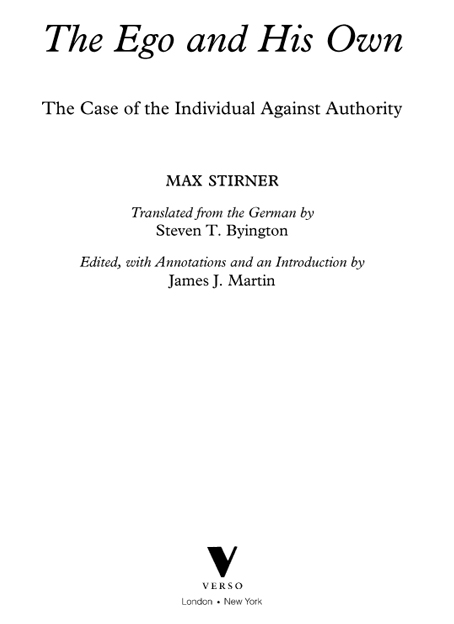This paperback edition first published by Verso 2014
First published by the Libertarian Book Club, New York 1963
All rights reserved
The moral rights of the authors have been asserted
Verso
UK: 6 Meard Street, London W1F 0EG
US: 20 Jay Street, Suite 1010, Brooklyn, NY 11201
www.versobooks.com
Verso is the imprint of New Left Books
ISBN-13: 978-1-78168-156-5
eBook ISBN: 978-1-78168-210-4
eISBN (UK): 978-1-78168-519-8
British Library Cataloguing in Publication Data
A catalogue record for this book is available from the British Library
Library of Congress Cataloging-in-Publication Data
A catalog record for this book is available from the Library of Congress
v3.1
Contents
Editors Introduction
Fifty years sooner or later can make little difference in the case of a book so revolutionary as this. This was the opening sentence of James L. Walkers introduction to the first English language issuance of Max Stirners Der Einzige und sein Eigentum by Benjamin R. Tucker in 1907. It is probably as succinct and concise a summarization of the significance of the book as has ever been uttered. But Walker has not been the only one to speak of Stirner in this manner. Two years later James Huneker, in his famous evaluation, referred to the book as the most revolutionary ever written. He has left behind him a veritable breviary of destruction, a striking and dangerous book, Huneker declared; it is dangerous in every sense of the wordto socialism, to politicians, to hypocrisy.
There is little doubt that The Ego and His Own is one of the most formidable assaults on authoritarianism ever launched. It may even belong in the first position as such. It is at once a historical document, a pamphlet of the intellectual disturbance of the mid-nineteenth century, and a timeless classic. Its persistent reappearance in one language or another in the last hundred years testifies to the latter.
However, the attention to Stirner has not been smooth and steady, but, rather, irregular and spasmodic. Its appearance in English for the first time was a product of one of these surges of interest, largely ignited by the great impact of
It is not of prime significance that Max Stirners life be stressed here, though a few items of substance may be mentioned. He was born Johann Kaspar Schmidt in Bayreuth, Germany on October 25, 1806. The name he adopted as a pseudonym was originally a nickname from student days, a reference to his broad, high forehead. His career prior to the writing of his first, and major, book was obscure, though it included education in three universities, and half a dozen years experience in teaching. His first wife died in childbirth in 1838, and he remarried in 1843, which also appears to be the date when he began to draw together his thoughts and material into the book which was to shock and outrage a goodly portion of intellectual Germany the year after, and subsequently the whole Western world.
From internal evidence it appears that he completed Der Einzige sometime in February or March, 1844. A rather expert job of book production followed, for, although the book bore the date 1845, it was actually in the hands of readers in November, 1844. The Leipzig house of Otto Wigand issued it in an octavo volume of about 500 pages.
Stirners book came out at a stormy time in Western and Central European affairs. France, Italy and the whole German world were in furious distress caused by the pressure of Liberalism upon the monarchical structure of politics in these lands, clamoring for a voice in the making of public policy and the running of affairs. And in the background and the underground boiled the propaganda of socialism, supervised by a score or more expert tenders of mainly French and German origin. The philosophical proponents of the powerful national secular State had also made their appearance, and the polished thought of Johann Gottlieb Fichte and Georg Wilhelm Friedrich Hegel, in particular the latter, had made a deep impression on the thinkers of the whole political spectrum of the time.
In a way, Stirner was both a product and a victim of these factors. His book came out of them, and it was buried in the avalanche of the revolutions of March 1848 and thereafter. But in the interval between its publication and the uprising of the 48ers, a lively intellectual conflict spread. Few books have aroused such hostility and general disparagement as Stirners, though it was not the authors intent to avoid a battle, by any means. His spirited polemics against the principal figures among the so-called Left Hegelians, the Junghegelianer, particularly Ludwig Feuerbach and Bruno Bauer, invited reprisal, let alone his equally rousing tilt with the socialists, especially Wilhelm Weitling and Moses Hess. Stirner represented a third force in these agitated times, neither a defender of the theological or monarchical State, nor a protagonist of the secular models advanced by the Liberals and socialists. His views were as shocking and repellent to the latter as to the former. And Stirner went into almost total eclipse in the following forty years, while the modern secular State took shape, with its distinctive homogenization of the new nationalism and socialism, and the surviving but mutated strains of the earlier divine right and ecclesiastical authority, plus the ingredients consisting of the enfranchised and compulsorily armed masses which the French Revolution contributed.
Stirners principal intellectual and social company had been the Berliners of Hegelian inspiration and tendencies whom he had encountered at Hippels restaurant, who were And in an important sense a thorough reading and understanding of Hegel is necessary to understand Stirner. The assault on the master was not an explicit one, however. Hegel is mentioned sparingly, though significantly, in a direct sense. It is through his younger exponents that Stirner propels his critique of their State and its related personifications and generalized ideas.
It was in the company of these persons that such previews of Stirner as exist made their appearance. He published a few articles in the Hallische Jahrbcher and the Deutsche Jahrbcher, ephemeral journals edited by Arnold Ruge
The history of Der Einzige und sein Eigentum is worthy of a glance. After its first appearance, it sank out of sight for nearly four decades. The original publishing house of Wigand brought out a second edition in 1882, and a third in 1901.the 1892 Universal-Bibliotek edition of Philipp Reclam, Jr., also of Leipzig, in the famous Miniatur-Ausgaben series, which found Stirner in the company of world-famous literature. The publication of a full-scale biography of Stirner by John Henry Mackay in 1893 preceded two translations in French which were published one after the other in Paris in 1900 under the title LUnique et sa Proprit. These set the stage for the English translation and publication.
The first American to dwell at length on Stirner was James L. Walker, a Texas newspaperman and later physician, and an associate of Tucker. Walker brought Stirners egoism into the pages of Tuckers world-famous anarchist weekly, Liberty, with increasing frequency during the 1890s, and himself prepared a strongly Stirner-influenced book, The Philosophy of Egoism






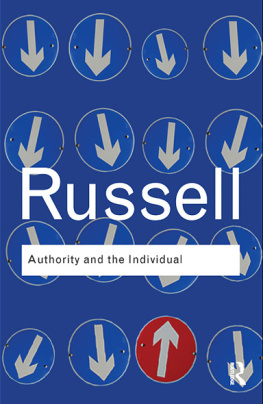
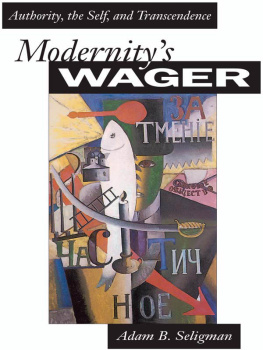
![Blackford - Freedom of religion [and] the secular state](/uploads/posts/book/167779/thumbs/blackford-freedom-of-religion-and-the-secular.jpg)
